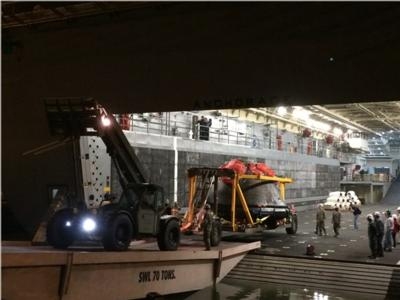Thu, Dec 11, 2014
Engineering Teams Analyzing Heat Shield, Data Recorders From Flight Test
Engineers are getting their first look at the Orion spacecraft following its successful flight test and recovery on Dec. 5. With the spacecraft recovered from the Pacific and brought to port in San Diego, technical teams are examining flight data recorders and samples of the heat shield to learn as much as possible about the performance of key systems during the test.

“The 1,200 on-board sensors will provide us an ocean of information about everything from the effects of space radiation on our avionics to the environment inside the crew cabin,” said Mike Hawes, Lockheed Martin vice president and Orion program manager. “What we learn from this flight will improve Orion’s designs and technology, and help us make future vehicles the best they can be.”
In San Diego engineers have removed samples of the heat shield to examine its performance and ablation rates during re-entry. The samples, along with select data recorders, will be brought to nearby Lockheed Martin facilities for processing. This analysis will help the technical team get a head start in determining how to optimize the development of future heat shields.
Orion will be loaded on a special truck for an estimated two-week trip across the country to Kennedy Space Center in Florida, where NASA and Lockheed Martin engineers will disassemble it and thoroughly examine its structure, computers and instrumentation. In March, as part of the Exploration Flight Test-1 (EFT-1) contract, Lockheed Martin will provide a complete data analysis report to NASA which includes information about the vehicle’s performance and recommendations based on the results.
The EFT-1 crew module will next be used for Ascent Abort Test 2, which is a test of the launch abort system. Orion’s launch abort system is equipped with three powerful motors capable of pulling the capsule and crew a mile up and a mile away from an emergency on the launch pad.
In addition, the Orion team has already begun procuring parts and manufacturing primary structures for the next spacecraft, which will be flown on the upcoming Exploration Mission-1 atop the powerful Space Launch System.
(Image provided by Lockheed Martin)
More News
Aviation Governance Secured...At Least For a While The National Business Aviation Association similarly applauded the passage of the FAA's recent reauthorization, contentedly recou>[...]
Emphasis On Growing The Future of Aviation Through Concentration on 'AFFORDABLE FLYERS' It's been a number of years since the Latest Edition of Jim Campbell's HUGE SportPlane Resou>[...]
Amazilia Aerospace GmbH, Develops Digital Flight Control, Flight Guidance And Vehicle Management Systems Textron eAviation has acquired substantially all the assets of Amazilia Aer>[...]
Honeywell's Primus Brings New Tools and Niceties for Hawker Operators Hawker 4000 business jet operators have a new installation on the table, now that the FAA has granted an STC f>[...]
Company Celebrates Niche-but-Important Advancement in Industry Standards Echodyne has announced full integration of its proprietary 'EchoFlight' radar into the e American Aerospace>[...]
 Bolen Gives Congress a Rare Thumbs-Up
Bolen Gives Congress a Rare Thumbs-Up The SportPlane Resource Guide RETURNS!!!!
The SportPlane Resource Guide RETURNS!!!! Buying Sprees Continue: Textron eAviation Takes On Amazilia Aerospace
Buying Sprees Continue: Textron eAviation Takes On Amazilia Aerospace Hawker 4000 Bizjets Gain Nav System, Data Link STC
Hawker 4000 Bizjets Gain Nav System, Data Link STC Echodyne Gets BVLOS Waiver for AiRanger Aircraft
Echodyne Gets BVLOS Waiver for AiRanger Aircraft



